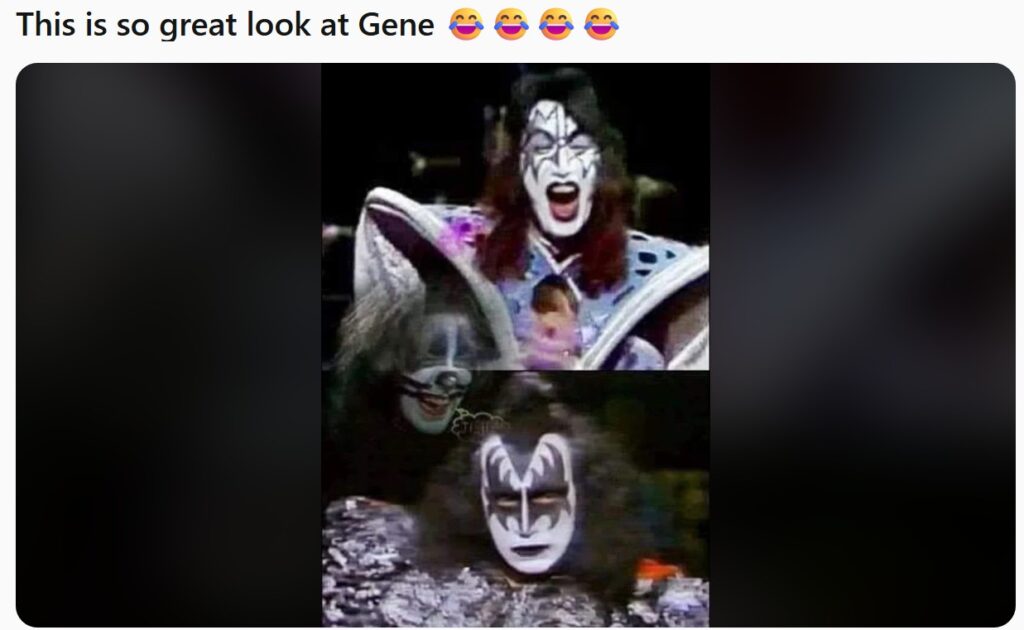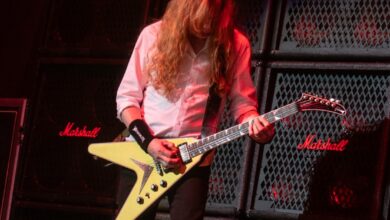Ace Frehley’s Legendary 1979 Tomorrow Show Interview
It’s impossible to watch Ace Frehley’s famous 1979 appearance on The Tomorrow Show without smiling. Dressed in full KISS makeup, eyes gleaming like a mischievous comic-book hero, he dissolved the entire set into laughter with his wild, unfiltered energy. Tom Snyder, the show’s host, could barely keep the interview on track as Ace leaned back in his chair and unleashed that now-legendary cackle—the one fans have since dubbed the “Joker laugh.” It was raw, infectious, and perfectly Ace: half rock star, half cosmic trickster, a man who seemed incapable of taking life—or fame—too seriously.
That laugh has resurfaced everywhere today, for bittersweet reasons. News of Frehley’s death has shaken the rock world, and fans are flooding social media with clips from that 1979 interview. It’s strange and beautiful how the same laugh that once made America erupt with joy now echoes like a farewell—one final, defiant roar of humor from a man who never wanted to play by the rules.
In the clip, Paul Stanley and Gene Simmons sit beside him, visibly trying to keep the conversation grounded, while Ace is clearly in his own orbit. Every question Snyder asks turns into a setup for Ace’s playful chaos. When Snyder calls him “the funny one,” Ace bursts into another fit of laughter so uncontrollable that even Gene, normally the unflappable demon, cracks a grin. It’s pure television magic—a rock interview that somehow turned into stand-up comedy.
Fans still debate whether that laugh was spontaneous or deliberately exaggerated for the cameras. But that’s the thing about Ace Frehley: you could never tell where the performance ended and the man began. His humor wasn’t rehearsed; it was instinctive. He lived in the moment, feeding off whatever energy the universe threw at him, whether it was a stadium crowd or a confused talk show host.
Over the decades, that “Joker laugh” became one of the most replayed clips in KISS history. Some fans compare it to Heath Ledger’s dark grin or Jack Nicholson’s maniacal tone, but Ace’s version came first—and it wasn’t sinister. It was joy wearing chaos as a costume. It reminded everyone that KISS wasn’t just about fire and thunder; it was also about fun, personality, and the pure absurdity of being larger than life.
Watching that moment now hits differently. The same wild spark that made him uncontrollably giggle on live TV is what defined his approach to everything—his solos, his stage persona, even his public feuds. Ace didn’t just play rock and roll; he laughed it into existence. That laughter was his rebellion against taking fame too seriously.
Today, fans are revisiting that clip not just for nostalgia but for comfort. “This is how I want to remember him,” one fan wrote online. “Laughing like he just discovered electricity.” The sentiment captures what made Frehley special: behind the smoke and silver paint was a man who never lost his sense of play. He could make a million people headbang—and then laugh right alongside them.
In retrospect, that Tomorrow Show interview feels prophetic. You can sense in his laughter a refusal to be boxed in. The rest of the band is composed, professional, rehearsed—but Ace? He’s pure id, the embodiment of everything unpredictable about rock music. That laugh wasn’t just a sound; it was a statement: “You can’t script me.”
Now, decades later, that clip has become a kind of memorial. It’s not solemn or heavy—it’s joyful, chaotic, and alive, just like the man himself. Fans are calling it “the moment that defines him,” the spiritual opposite of silence. Where others might leave behind somber interviews or last words, Ace left behind a laugh so contagious that it still spreads warmth across generations.
The “Joker” comparison makes sense in a poetic way. The Joker laughs at the absurdity of life; Ace laughed at the absurdity of fame. Both turned unpredictability into art. But unlike the Joker’s madness, Ace’s laughter was life-affirming—a reminder that even when the world feels heavy, you can always tilt your head back, grin through the chaos, and let out something unfiltered and true.
In one of his later interviews, Ace was asked about that night on The Tomorrow Show. He chuckled and said, “Yeah, I was just having fun. People keep talking about that laugh—I guess it was honest!” That’s the perfect epitaph for him: honest laughter, honest music, honest chaos. He never tried to hide behind polish or perfection. He gave you what he was, unedited.

And that’s why his loss hurts so much. The music world can replace sound and spectacle, but it can’t replicate authentic joy. The same guy who made audiences scream also made them laugh, something few guitar gods ever achieved. His laugh wasn’t a gimmick—it was his soul breaking through the mask.
As the tributes pour in, fans are stitching together montages of that moment—Ace leaning back, roaring with laughter, eyes gleaming through silver paint. It feels like he’s still here, mocking mortality itself, daring anyone to stay sad while his voice echoes in the background: “HA-HA-HA-HA-HA!”
In the end, the Tomorrow Show clip doesn’t feel like an interview anymore. It feels like a time capsule—one man’s pure, unfiltered joy sealed forever in a few chaotic minutes of late-night TV. And now, as the world says goodbye to Ace Frehley, that laugh stands as his final encore: loud, cosmic, uncontainable, and completely unforgettable.
Even death can’t silence that sound. It was never just laughter—it was the pulse of a man who lived every moment like a guitar solo: loud, unpredictable, and utterly alive.





